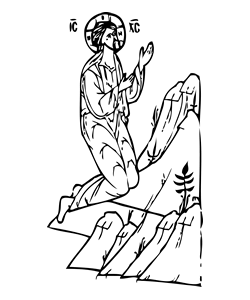|
|||
|---|---|---|---|
| This weekly bulletin insert complements the curriculum published by the Department of Christian Education of the Orthodox Church in America. This and many other Christian Education resources are available at http://dce.oca.org. | |||

At the end of the calendar year, we read from Mark's Gospel, 11: 11-26. The narrative begins with Jesus' arrival in Jerusalem. The first place Jesus goes is the Temple. After He has "looked around at everything" there, He and the twelve apostles go off to Bethany as the day ends. The next morning they return to Jerusalem, and Mark records one of the most unsettling incidents in the Gospels. Jesus is hungry, and when He sees a fig tree from afar, He approaches it to look for fruit. The tree has leaves, but no figs. Jesus curses (meaning that He passes judgment on) the fig tree: "May no one ever eat fruit from you again." This might seem to be an uncharacteristically harsh thing for the compassionate Lord to do, especially because the passage tells us that "it was not the season for figs." But fig trees grow in a certain way: the fruit usually appears before the leaves, so a tree with leaves could be expected to have fruit as well. Even a tree "out of season" might have fruit because fig trees often produce several crops each year. Jesus was with His apostles, and the fig tree provided a lesson for them: the outward appearance of "fruitfulness" is not enough. All of us must produce real fruit, and take care not to look as though we are doing so when in fact our spiritual lives are barren. Now Jesus is about to return to the place He went to first the day before, the place like no other—the Temple. There He will make it plain that Israel's way of worship has become barren and fruitless by driving out "those who bought and sold in the Temple." He accuses them of making a holy place into a "den of robbers." That phrase is from Jeremiah 7:11, which means that this isn't the first time the religious leaders have been warned that they are disrespecting God's house. Hearing His words, the current leaders don't take the lesson; instead they seek ways to destroy Him. To emphasize that Jesus truly respects the Temple as a place of pre-eminent holiness, Mark adds a detail that is found only in his Gospel, writing that Jesus "would not allow anyone to carry anything through the temple." This greatest place of worship is not to be used as a convenient shortcut or a covered thoroughfare. The morning after this momentous event, Jesus and the apostles pass the fig tree again. Peter exclaims, "Rabbi, look! The fig tree which You cursed has withered away." The Lord's power is clearly real, and so is His warning about fruitlessness. Jesus reminds the apostles, and us, to be prayerful. A faithful and believing person will receive a beneficial answer to prayer, and will be able to do great things, as they have seen Him do. He adds that as we pray we should forgive, if we have anything against anyone, so that the Father in heaven may also forgive us. What good words with which to look toward the start of the new year. |
|||
